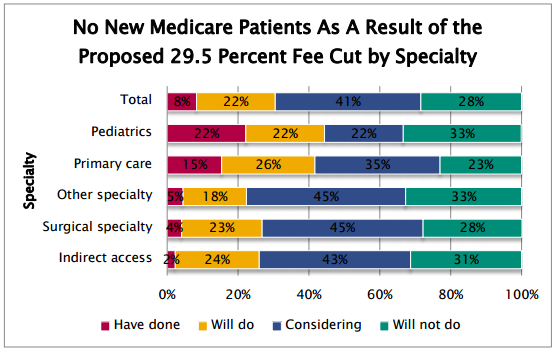How MACRA Resolves Sustainable Growth Rate Formula Challenges
The Medicare sustainable growth rate formula held a wide number of problems with physician payment cuts as one of its bigger obstacles.

- The Medicare Access and CHIP Reauthorization Act of 2015 (MACRA) will likely simplify and improve Medicare reimbursement processes due to the fact that it repeals the flawed sustainable growth rate (SGR) formula. The problems associated with the sustainable growth rate formula entailed costly short-term fixes, significant payment cuts for physicians, and complex administrative burdens with managing multiple Medicare quality reporting programs.

However, when MACRA legislation was passed, it replaced the SGR formula and its more than 20 percent physician payment cuts, incentivized value-based care reimbursement, and simplified reporting of quality performance programs by bringing it under one umbrella.
As early as 2014, there has been bipartisan support for the repeal of the Medicare sustainable growth rate formula as well as assistance from healthcare organizations like the American Medical Association.
The major problem with the SGR formula related to its limit on physician payments while, at the same time, not considering the complexity or amount of healthcare services, according to the Doctors for America publication. There were no incentives within the regulatory protocol to help physicians limit the volume of services and further insisted on cutting payment rates, which could lead higher rates of physician burnout and a negative impact on healthcare access for Medicare beneficiaries.
The Texas Medical Association released a survey in August 2011 that details what healthcare providers were considering when a Medicare payment decrease of 29.5 percent was likely to be passed by Congress.
Out of all polled practicing physicians, 8 percent had already stopped accepting new Medicare patients, 22 percent were going to stop accepting new Medicare patients, and as many as 41 percent were considering this as an option. This data illustrates how the sustainable growth rate formula was essentially blocking healthcare access to Medicare beneficiaries.
The sustainable growth rate formula brought short-term fixes, which had to be implemented on an annual basis. Congress had to balance the budget for years while understanding that the 1997 Medicare SGR formula was “broken beyond repair,” reports Kaiser Health News.
Sometimes physicians saw deferrals instead of having their payments cut, but the risk was often held over their heads. In 2010, Congress did delay these payment cuts a total of five times, but there were often disagreements between the Democratic and Republican party regarding how to fix the problem. MACRA legislation passed in 2015, however, did have bipartisan support and put the matter to rest.
“This flawed SGR formula really was a threat to access to care for patients. It was also a threat to practice stability and therefore an inhibitor to investment in practices toward new payment delivery systems,” James L. Madara, MD, Chief Executive Officer and Executive Vice President of the American Medical Association (AMA), stated during a media conference in 2015. “With the SGR behind us, we can now work toward those other elements with Congress, CMS, and others, putting the patients first and ensuring access to care, looking to reduce overall costs, and improving healthcare quality.”
When MACRA was initially passed, physicians were able to steer clear of a 21 percent Medicare payment decrease. MACRA legislation also eliminated the administrative burden associated with quality reporting for many Medicare quality improvement programs. The way this occurs is by bringing these quality reporting programs under a new framework that rewards physicians for better value via two tracks: the Merit-based Incentive Payment System (MIPS), and Alternative Payment Models (APMs), states the American Academy of Family Physicians (AAFP).
Additionally, three common payment programs CMS administers (the value-based payment modifier, physician quality reporting system, and meaningful use) will all be brought under one umbrella through MIPS. An extra quality payment category is also incorporated under MIPS called clinical practice improvement activities.
The most important solution that MACRA legislation brings to the problems associated with the former Medicare sustainable growth rate formula is its emphasis on value-based care reimbursement. In 2011, the Medicare Payment Advisory Commission (MedPAC) had actually sent a letter to lawmakers stating that the sustainable growth rate formula “has failed to restrain volume growth and, in fact, may have exacerbated it” and is “fundamentally flawed,” reports Kaiser Health News.
Essentially, the SGR formula relied heavily on fee-for-service payments and this traditional payment system incentivized physicians to order more tests, require more visits with patients, and complete more procedures instead of solely delivering quality care. MACRA legislation, however, relies on value-based care and is meant to incentivize doctors to reduce wasteful spending and improve quality.
The outcome of MACRA legislation may be more positive for beneficiaries, providers, and public payers. Providers will be reimbursed fairly while beneficiaries will likely experience better services and improved outcomes. CMS may see a decrease in wasteful spending as well. Commercial payers such as Cigna are also following CMS lead and investing more heavily in value-based care reimbursement.
“Cigna has been a leader in value-based care reimbursement since 2008 and we are well on the way to having value-based reimbursements represent the majority of our arrangements with providers by 2018. This is fundamentally changing the relationship between payers and providers by making the relationship much more collaborative. There is now much more focus on working together to improve quality and affordability so that the customers/patients we jointly serve have better outcomes and enjoy a better experience,” Mark Slitt, Spokesman and Public Relations Manager at Cigna, told HealthPayerIntelligence.com.
Image Credits: Texas Medical Association
Dig Deeper:
How Payers Should Prepare for Value-Based Reimbursement
MACRA Rule Revolutionizes the US Healthcare Payment System

